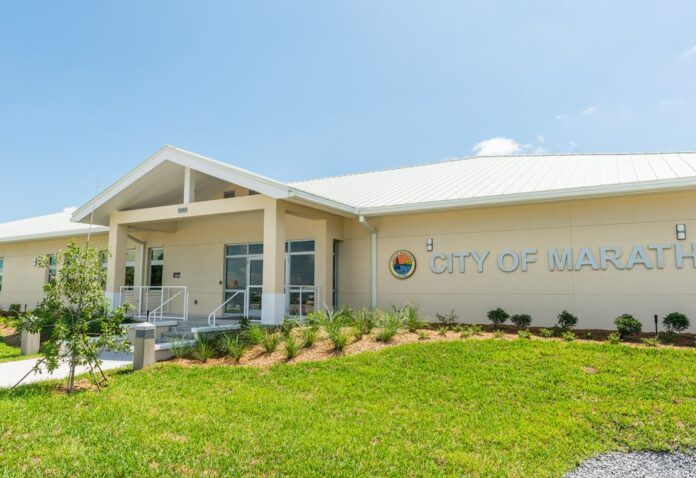
A week after their county counterparts navigated deep staffing cuts and slashed funding for local nonprofits, the Marathon City Council set itself up for a delicate balance between tightening purse strings and rising employee salaries in budget meetings this September.
In a special budget session on July 22, Finance Director Jennifer Johnson presented the council with the city’s preliminary spending plan, matching last year’s tax rate at a millage of 2.2235 ($222.35 per $100,000 of taxable assessed value).
With rising home values, Johnson said, this rate would still be considered a tax increase of 7.77% for Marathon. Matching the city’s ad valorem tax revenue from 2024-25 would require a rollback millage rate of 2.0631.
As presented Tuesday night, roughly $11 million in ad valorem taxes would contribute to $23.3 million in total revenues for the city, set against $25.7 million in budgeted expenses. The $2.4 million deficit, Johnson said, would lower the city’s reserves, but would keep levels just slightly above Marathon’s target of 12 months’ worth of operating reserves. The emergency reserves are used in the case of disasters or significant legal settlements, Johnson said.
Significant increased expenses over the previous year’s budget included a proposed 20% jump in staff health insurance benefits as well as contracted pay increases, additional training programs and five additional positions for Marathon Fire Rescue.
The Public Works department would see five new positions in the proposal, three and a half of which are transfers from the Parks and Recreation department. Transfers to the city’s street maintenance fund will increase from $140,000 in 2024-25 to $550,000 in 2025-26 – and that number will likely need to increase again the following year to compensate for $200,000 in deficit spending, Johnson said.
Though they avoided a deep dive into the topic, council members were quick to zero in on cost of living adjustments (COLA) for staff, set at 2.2% in Tuesday’s proposal based on released data from April 2025 in Miami-Dade and Fort Lauderdale. But councilwoman Robyn Still was quick to ask for a 5% bump instead, arguing that staff raises should roughly mirror increased vendor costs paid by the city.
Last September, a robust debate over staff raises ended in an agreement to use June COLA figures from Miami-Dade to determine the city’s staff adjustments for the upcoming budget. In 2025, that newly-released June figure was 3.1%, Johnson said. Upping staff raises from 2.2% to 5%, she added, would tack on roughly $154,000 to the city’s budget.
Mayor Lynn Landry said that while he stood behind filling vacant staff jobs as a service to residents, he worried that fully-funded positions could carry hefty implications for future tax years.
“I’m more concerned about setting a millage rate that’s reasonable and rational, that doesn’t leave the next council in a bind,” he said. “There may not be as many rollover positions unfunded in this budget as last budget. So if we run a $2.4 million deficit (in the budget), we may actually run a $2.4 million deficit. … But if that leaves us in a lurch next year at a 25 or 30% (tax) increase, I’m sure that’s not going to go over very well in this community.”
“It’s easy to spend other people’s money, and I want to be fair to our staff, but we put together a process,” said Vice Mayor Jeff Smith, referencing salary adjustments made after a recent staff-wide compensation study. “Last year, we said ‘Okay, we’ve adjusted everybody now, we’ve done our study, we’re running based on June COLA,’ and I don’t want to deviate from that. (It’s) a process, we put it in place, and that’s it.”
“I think there’s a lot of tightening up to do in this budget, and I hope we can make that happen, because we’re spending other people’s money,” said councilman Kenny Matlock.
A motion by Landry to set the millage at 2.3434, the maximum millage allowed through a simple majority vote, was approved 3-2, with Matlock and councilwoman Lynny Del Gaizo against. The millage may be decreased, but not increased, in future budget meetings, set for Sept. 16 and 23, both at 5:30 p.m. at City Hall. If preserved, the approved millage rate would represent a 13.59% increase over the rollback rate, but would decrease deficit spending to $1.8 million.
While local nonprofit organizations saw their funding slashed last week in unincorporated Monroe County due to pressure from the state Department of Government Efficiency, Johnson told the Weekly after the meeting that Marathon’s nonprofit grants program was preserved in Tuesday’s proposed spending plan. Reinstated in 2023, Marathon doles out annual awards totaling $150,000 to a wide variety of Middle Keys service nonprofits.






















